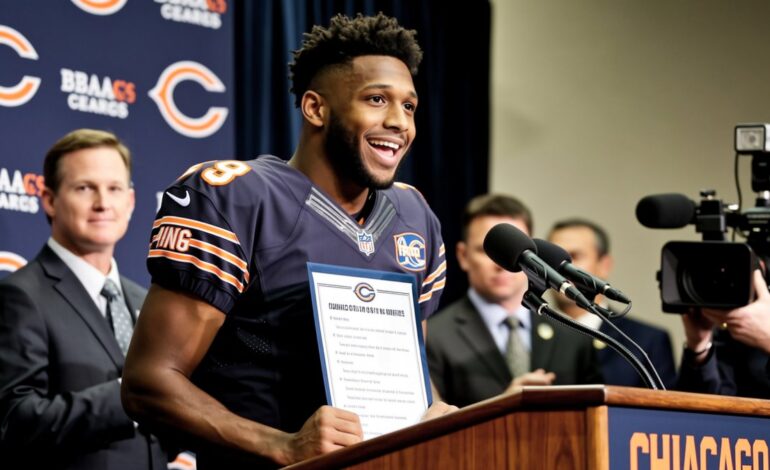Tyson Bagent’s $10 Million NFL Contract Extension and the Bittersweet Reality Behind the Tears

“Of course this happened.” That’s what I muttered into my lukewarm coffee at 2 a.m. as yet another feel-good sports story unfolded like a Netflix holiday special—complete with emotional dad moments, tearful press conferences, and enough heartwarming clichés to make even the most cynical among us roll our eyes while secretly Googling “how much do backup quarterbacks really contribute?”
Tyson Bagent, the Chicago Bears’ backup quarterback who went from obscurity to a two-year, $10 million contract extension, recently got misty-eyed during a press conference where he credited his father, Travis Bagent—a former arm-wrestling champ who raised Tyson in West Virginia without running water until high school.
Yes, you read that right. The man now worth $10 million was raised in a house without basic plumbing. And sure, it’s touching. But let’s not pretend this isn’t also a reminder of how absurdly disproportionate success can be in professional sports. One moment you’re dodging frostbite in a drafty trailer, the next you’re signing life-changing checks while cameras roll. It’s inspiring, yes—but also deeply unsettling when you consider the millions handed out for essentially throwing a ball better than other guys named Tyler or Trevor.
Bagent, 25, signed the deal in August 2024, locking him in with the Bears through 2027. He’s currently the backup to rookie sensation Caleb Williams, which means he might spend more time on the bench than under the Friday night lights. Still, the team is thrilled with his work ethic and leadership qualities. General Manager Ryan Poles called Bagent “a catalyst for positive influence throughout our entire organization,” while coach Ben Johnson praised his embodiment of the team’s values: hard work, belief, and apparently, humble beginnings involving outhouses.
But here’s the kicker: while Bagent’s rise is genuinely remarkable, it’s also part of a broader pattern in sports where talent is often overshadowed by financial spectacle. Let’s take a look at some of the other big earners in the game. Cristiano Ronaldo, who left Manchester United in 2022, reportedly earns around $200 million annually playing in Saudi Arabia. Lionel Messi? He’s pulling down over $20 million a year with Inter Miami CF. These numbers are so inflated they’ve become meaningless outside of tabloid headlines and Instagram flex posts.
And then there’s the elephant in the locker room: the gender pay gap. Despite U.S. Soccer finally equalizing World Cup prize money between men’s and women’s teams, female athletes still lag far behind their male counterparts in overall earnings. Case in point? Alex Morgan, one of the biggest names in American soccer, earned just $600,000 on-field in 2024 before retiring, compared to her estimated $7 million in off-field endorsements. She didn’t even crack Forbes’ top 50 highest-paid athletes list in 2025.
So while Bagent’s contract is a feel-good story wrapped in a Hallmark subplot, it’s also a microcosm of everything wrong—and occasionally right—with modern sports culture. We celebrate individual triumphs while ignoring systemic imbalances. We cry at press conferences but shrug at billion-dollar leagues built on unpaid college labor and injury-laden careers.
In short: enjoy the tears, but don’t forget the context. Because if history tells us anything, it’s that the next headline will probably be even more ridiculous.
Sources: Celebrity Storm and E! News, ESPN, MLS Players Association
Generated by AI




